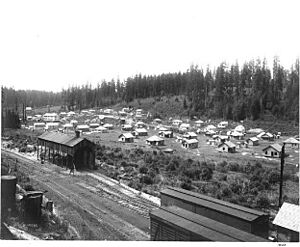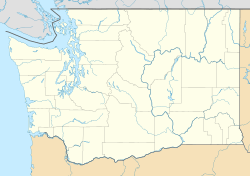Tono, Washington facts for kids
Quick facts for kids
Tono, Washington
|
|
|---|---|

Tono in 1909
|
|
| Country | United States |
| State | Washington |
| County | Thurston |
| Founded | 1907 |
| Time zone | UTC-8 (Pacific (PST)) |
| • Summer (DST) | UTC-7 (PDT) |
Tono is a fascinating ghost town located in the southwestern part of Washington state, in the United States. A ghost town is a place that was once a busy community but is now mostly empty or completely abandoned.
Tono started in 1907 as a special town built by a company. This company was called the Washington Union Coal Company. It was part of the Union Pacific Railroad, a big train company. They needed Tono to dig up coal for their powerful steam locomotives, which are like old-fashioned trains. Tono was found in southern Thurston County. It was about 20 miles south of Olympia, Washington, and close to other towns like Tenino and Bucoda. It was at the very end of a train track built just for the town.
Contents
The Story of Tono
How Tono Got Its Name
The town of Tono got its name in 1909. Many Japanese railroad workers helped build the tracks and the town. One of them named it Tono, possibly after a place in Japan called Tōno, Iwate. Some people also say the name "Tono" is a short way of saying "ton of coal." This makes sense because so much coal was dug there!
Life in a Coal Town
Tono was a very busy place in the 1920s. At its busiest, more than 1,000 people lived there. The town had about 125 houses, a hotel, a hospital, and a general store where people could buy everything they needed. There was even a school for the children. The town was thriving because the coal mines were working hard.
The Town Starts to Fade
Things began to change for Tono in 1932. This was when train companies, like Union Pacific, started using new diesel locomotives instead of steam trains. Diesel trains didn't need coal, so the demand for coal from Tono went down.
The Union Pacific Railroad then sold the mines to a different company, the Bucoda Mining Company. After this, the mines only worked sometimes. Many people started to move away from Tono to find work elsewhere. Some of the empty houses were even sold and moved to other nearby towns. By 1950, only a few buildings and people were left in Tono.
The last people who lived in Tono full-time were John and Lempi Hirvela. They had moved there in 1923. They lived in the very last house that was still standing, which used to be the mine superintendent's home. They stayed there until 1976.
Tono Disappears
In 1967, a company called the Pacific Power & Light Company started mining in the Tono area again. This area became known as the Centralia Coal Mine. The company bought all the land, including where the town of Tono used to be, and even the Hirvelas' home.
They began a type of mining called strip mining. This means they removed layers of earth to get to the coal underneath. They needed the coal to power the Centralia Power Plant in nearby Lewis County.
Sadly, because of all this mining, most of the old town site of Tono was completely removed in the 1980s. Today, if you visit the area, you will only find a few old foundations that are covered by plants. These are the only things left of what was once a busy coal town.
 | Madam C. J. Walker |
 | Janet Emerson Bashen |
 | Annie Turnbo Malone |
 | Maggie L. Walker |



